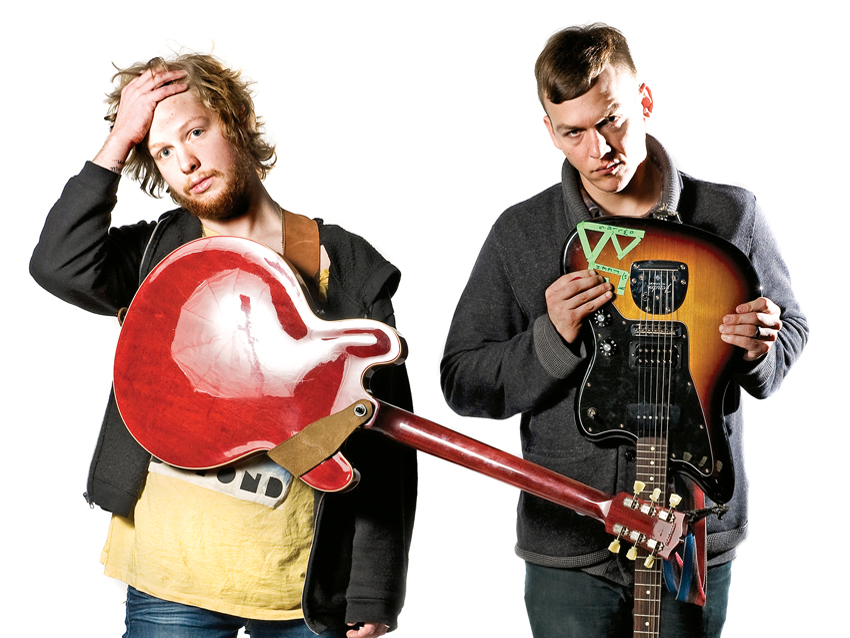Interview: Cage The Elephant's Brad Shultz and Lincoln Parish

Cage The Elephant

Cage The Elephant

Cage The Elephant
In an age when record companies confine most bands to cramped but profitable boxes, it's refreshing to come across acts like Cage The Elephant.The band don't cling slavishly to one vibe, but mash together raw punk riffs with wisecracking jolts of electro pop that owe as much to Beck as they do the Buzzcocks.
Their self-titled debut album sold nearly 400,000 copies after its release in 2008 and pushed hit track Ain't No Rest For The Wicked all over the place, from mainstream radio to the soundtrack of the million-selling videogame Borderlands.
But after a stint living in the UK, the group hit a wall, and their confidence drained. So they retreated to the quiet hills of their home state Kentucky to write slamming new album, Thank You, Happy Birthday, which debuted at number two on the Billboard 200 chart after its US release in January 2011.
Fearlessly jumping between genres, the album goes from full-throttle punk to serene introspection in the space of a heartbeat. We caught up with guitarists Brad Shultz and Lincoln Parish to find out about the band's newly dynamic sound.
How does the new album compare to your self-titled debut and what prompted your change in sound?
Brad Shultz: "It's a big departure from the debut. We went through a big period when we first came over to the UK. We were into rock, but the whole electronic, new wave thing was happening in Britain. And we were kind of like the kids looking inside the glass house at all the cool kids in there having a good time.
"The producer put flat-wound strings on my Gretsch Country Gentleman, which really pisses me off!" Lincoln Parish
"So we went through a lot of frustration and it almost started causing some self-doubt within the band. Initially, we wrote 30 or 40 songs, but we ended up scrapping them and using a bunch of songs that we had for our supposed side-projects instead."
Get the MusicRadar Newsletter
Want all the hottest music and gear news, reviews, deals, features and more, direct to your inbox? Sign up here.
There are some stark contrasts, from the psychotic fury of Sabertooth Tiger to the placid beauty of Rubber Ball. Where did those highs and lows come from?
Lincoln Parish: "Looking back on it, a lot of those songs were formed out of frustration. If anything, it wasn't like, 'Let's do a high-energy song', but we were feeling a lot of frustration at the time.
"Often, when you're feeling frustration the music that you write reflects that. Same with the opposite sounds as well."
BS: "The first album we wrote… I don't want to say we totally catered to a specific sound, but we definitely had a rough idea of what we wanted it to sound like.
"With the second album we just wrote songs and worked those songs out the best that we possibly could, and that became the album."
It's a cocktail of styles and killer tones. What gear did you use to get those sounds?
BS: "Basically, we use anything we can find that will fit the song. For example, on Rubber Ball, there's a part that sounds like an opera kinda thing. That's actually a church choir.
"We had heard it playing on TV and ran upstairs, took this old shitty Casio keyboard and recorded the choir through the keyboard and played it on the track. So we take inspiration wherever we can get it.
"In terms of guitars, I used a Jazzmaster and Teles. We also used an [Electra] MPC guitar, which is from the early '80s. It has all these built-in effects, including the nastiest fuzz you'll ever get. You can run it direct and it sounds so gnarly.
"As far as pedals go, there was a Big Muff, Fuzz Factory, Memory Man…"
LP: "Like Brad said, whatever works on the song. I've had the same Les Paul Goldtop for five or six years now and that's kinda my mainstay, but I just got a [Gibson] 335 that I'm really liking and an Epiphone Wilshire that I really like, too.
"But probably one of my favourite guitars that I used on the album was a Gretsch Country Gentleman that the producer handed me. It's an old one from the '60s. He put flat-wound [strings] on it, which really pisses me off!"
Other than the gear, what else influenced your approach this time?
BS: "When we moved over to Britain it opened our eyes to a whole load of stuff, and we got into bands like Pixies and Mudhoney. But we also revisited some stuff like Nirvana that we all grew up on. Presidents Of The USA…"
LP: "Yeah, a lot of stuff that we loved when we were younger, but we didn't really know why we loved it. Pavement, Mudhoney and also a band that we first came across in the UK, Gang Of Four. Andy Gill is one of my favourite guitar players ever now."
How are your fans reacting to the dynamic new sound?
Brad: "I think a lot of people are liking the change in our music. Change is a good thing and it's a very natural process that helps us all carry on."
Lincoln: "Yeah, we don't want to make the same album twice. Our next album's going to be a bossa nova!"
Total Guitar is Europe's best-selling guitar magazine.
Every month we feature interviews with the biggest names and hottest new acts in guitar land, plus Guest Lessons from the stars.
Finally, our Rocked & Rated section is the place to go for reviews, round-ups and help setting up your guitars and gear.
Subscribe: http://bit.ly/totalguitar
“Every note counts and fits perfectly”: Kirk Hammett names his best Metallica solo – and no, it’s not One or Master Of Puppets
“I can write anything... Just tell me what you want. You want death metal in C? Okay, here it is. A little country and western? Reggae, blues, whatever”: Yngwie Malmsteen on classical epiphanies, modern art and why he embraces the cliff edge












